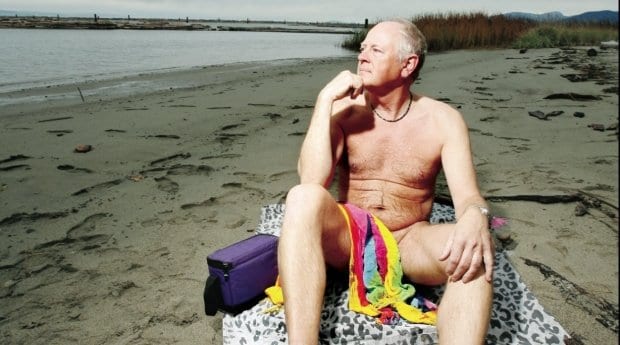Police officers will watch over Wreck Beach almost every day from the May 19 long weekend until Labour Day, according to a new RCMP plan.
Sergeant Drew Grainger, of the RCMP’s UBC branch, says he wants to establish a “storefront police presence” at the beach, a tent with uniformed police officers, to protect public safety. Grainger says police will crack down on illegal drug and alcohol sales, which he says are a threat to beachgoers. In the past, the RCMP have sometimes cast a blind eye on vendors selling beer and pot at the beach.
“There’s certainly some different tolerance levels down there,” Grainger says. “The way we want to approach it this year is to reduce those tolerances. Our overall objective is to make sure everyone is safe and secure.”
Grainger says the RCMP will not go after individual drinkers unless they are causing trouble. “If a family wants to come down or a group of people want to come down and have a bottle of wine or a six-pack of beer and continue to behave to the point of not causing harm to themselves or other people, then we can manage that,” he says. “As long as they aren’t blatantly showing it off to the public sphere.”
The changes are the initiative of Grainger and UBC RCMP commander Darren Malcolm, both of whom transferred last summer from Surrey, where, Grainger says, they used similar tactics to tackle drug crime.
Last August, the RCMP arrested and charged Alana Thomson, a woman who openly sold homemade alcoholic freezies at Wreck Beach. Grainger says it is his goal to go after “other Alana Thomsons” who might show their faces this year.
Grainger says the RCMP will not make any trouble for the beach’s usual community of nudists. “We fully understand and embrace and respect that it’s a clothing-optional beach,” he says. “We feel privileged to be part of that culture. We respect their rights to do that, and we want to protect them from people who might be preying on them.”
Longtime gay beachgoer Corey Giles (who works for Xtra’s publisher Pink Triangle Press) says he does not want police protecting him at Wreck Beach.
“I think having a police presence on the beach will anger a lot of people, and I don’t think it will help anything at all,” he says. “And it will really kill the vibe. There goes your friendly beach.”
People don’t appreciate the police presence that has appeared on the beach in recent years, Giles says. “Even if you’re not doing anything wrong, you feel like you’re doing something wrong, because here comes the fuzz, looking at your blanket and seeing what you’re doing and looking for suspicious things, even if you’re just playing the banjo.”
But Rick Fearman, a gay representative in the Wreck Beach Preservation Society who has been visiting the beach for 30 years, says the RCMP are a welcome presence.
“They’re doing their job,“ he says. “I get along with them fine. The gay community gets along with them fine.”
Fearman says RCMP officers help remove drunk, aggressive young men who often arrive on boats and help keep the busy main beach under control. As long as gay visitors get along with everyone else and keep cruising and hookups well hidden in the bushes, Fearman says, they have nothing to fear from the police.
“If you’re going to do it, just stay well in the bushes,” he says. “They don’t go hunting for people in the bush. I’ve never seen them do it once.”
Still, Giles thinks a permanent RCMP presence will have a chilling effect on the nudist and gay communities at Wreck Beach. “I’m not an unlawful person; I’m not a troublemaker, but almost every encounter I’ve had with police has been negative,” he says. “They’re antagonistic.”
When asked if there have been any incidents that prompted the new police presence, Grainger says no.
“But there is certainly an enormous amount of risk,” he says. “Public lewdness, where we’ll have people out there openly masturbating or voyeuring on people down there . . . There’s the drugs and alcohol down there, which can become a competitive market. We’ve seen that in the Downtown Eastside, where drug dealers will be against other drug dealers to make sure they’re the dealer in the area. We want to remove that kind of competition atmosphere.”
Giles says that if the RCMP really wants to tackle voyeurism, it should focus instead on the speedboats that anchor offshore and ogle naked beachgoers. Judy Williams, chair of the Wreck Beach Preservation Society, agrees.
“The real issues are beach safety because authorities will not ban jet skis in our swimming areas, because the party boats are being allowed to bombard and blast us with a cacophony of noise, fumes, angry engine noises, and water pollution, and because authorities go after the more-easily enforced orders to chase us off the beach before we can enjoy the beauty of afterglows,” she writes in an email. “Drinking is not the problem but ill-advised, heavy-handed policing that refuses to address the serious issues of human and wildlife safety from jet skis and muscle boats are.”


 Why you can trust Xtra
Why you can trust Xtra


